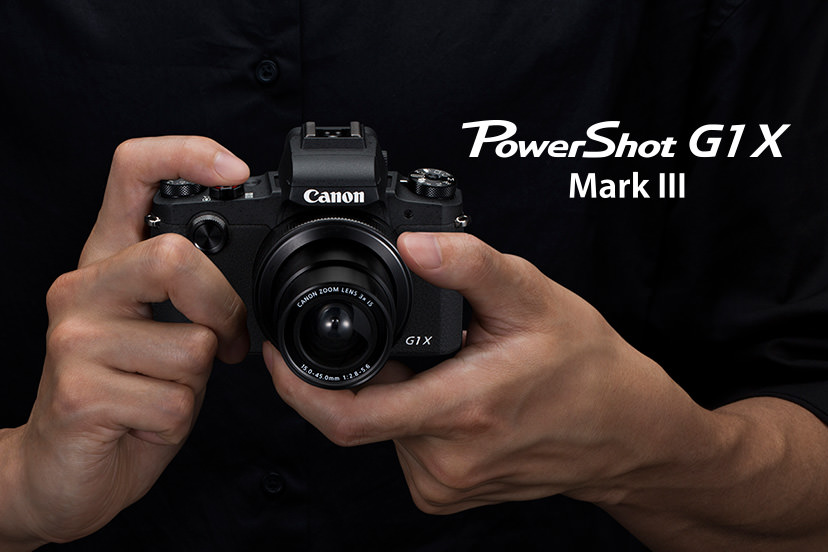The New PowerShot G1 X Mark III is Canon’s First Compact Camera with an APS-C size CMOS Sensor
On 16 October 2017, Canon announced its new compact digital camera, the PowerShot G1 X Mark III. The camera features a 24.2-megapixel APS-C size CMOS sensor, and will be the flagship model of the PowerShot G series. (Reported by: Makoto Suzuki (Digital Camera Watch))

Compact body packs in 24-72mm equivalent 3x zoom lens, built-in EVF

The PowerShot G1 X Mark III is Canon’s first fixed-lens camera to feature an APS-C size (approximately 22.3 × 14.9mm) CMOS image sensor. Users of DSLRs and mirrorless cameras who are looking for a compact sub camera that provides high image quality would find this an excellent choice. Not only so, users can expect fast autofocusing as this is also the first compact camera that Canon has equipped with Dual Pixel CMOS AF, the phase difference detection AF system that is also a feature on recent EOS series cameras. The camera body boasts a drip-proof, dust-proof construction.




Although equipped with a built-in EVF and an image sensor that is, at APS-C size, larger than the one on its predecessor (the PowerShot G1 X Mark II), the PowerShot G1 X Mark III is lighter and more compact, weighing only approximately 399g (including battery pack and memory card).
Key features
There are approximately 24.2 effective megapixels. The lens carries a 35mm format equivalent focal length range of 24 – 72mm, with an aperture range of f/2.8 – 5.6. The imaging processor is DIGIC 7, and the native ISO speed is ISO 100 – 25600. Continuous shooting is available up to 7 fps (frames per second) with AF tracking, and up to 9 fps with AF lock—the same as the EOS 80D, the EOS M5 and the EOS M6.

Dials and controls
The exposure control dial and control dial (around the up-down-left-right buttons) are located on the right-hand side of the top of the camera rear. There is a Quick Control Dial located on the front, where your right hand index finger would be when holding the camera. While the ring on the lens barrel can be used for zoom operation, there is also a zoom lever on the same axis as the shutter button, as is typical of a compact camera. The mode dial is equipped with a lock function.




Monitor
The 1.04-million dot 3.0-inch, touchscreen LCD monitor is the Vari-angle type, which makes it easier to shoot portrait orientation photos. It also supports Touch & Drag AF, which allows you to move the AF frame on the touchscreen monitor while looking through the EVF (electronic viewfinder). There are seven configuration options for the active touch area of the screen, and users can also choose from two positioning methods: “Absolute”, where the AF frame moves to the position you touch or where you drag it to on the screen, and “Relative”, where the frame moves relative to the direction and distance you drag. The EVF is OLED, 1cm (0.39-type) and has approximately 2.36-million dots.
Shooting functions and other features
The PowerShot G1 X Mark III comes with a new Panorama Shot mode that automatically stitches images together as you pan the camera. It also supports movie shooting at up to Full HD 60p quality, a Time Lapse Movie mode pre-set to the most commonly used settings, constant connection to a smart device via Bluetooth, and wireless transmission capabilities via Wi-Fi/NFC.

The PowerShot G1 X Mark III uses Battery Pack NB-13L, the same as the PowerShot G5 X, PowerShot G7 X and PowerShot G7 X Mark II, and the PowerShot G9 X and PowerShot G9 X Mark II. It can be charged within the camera body (USB charging) through the Micro USB terminal.
External dimensions are approximately 115.0 × 77.9 × 51.4mm. The weight is approximately 399g (including battery pack and memory card).
A lens hood (Lens Hood LH-DC110) is available, as well as an waterproof case (Waterproof Case WP-DC56) for underwater photographers. Both are sold separately.

The camera, attached with Lens Hood LH-DC110

Waterproof Case WP-DC56
Receive the latest update on photography news, tips and tricks.
Be part of the SNAPSHOT Community.
Sign Up Now!
About the Author
Delivers daily news related to topics such as digital cameras and peripheral devices, and imaging software. Also publishes articles such as reviews on the use of actual digital camera models and photo samples taken using new models.

































